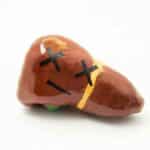Alcoholic hepatitis is a life-threatening form of liver failure that can be caused by heavy alcohol consumption. If you have a high alcohol intake, it can negatively impact your health and lead to an alcohol-related liver disease (ARLD).
The first stage of alcohol liver disease is hepatic steatosis. Alcoholic hepatitis represents a more advanced stage of the disease.
Causes Of Alcoholic Hepatitis
According to the National Institutes of Health (NIH), there are three stages of alcoholic liver disease:
- alcoholic fatty liver/steatosis (fat buildups in the liver parenchyma)
- alcoholic hepatitis (liver cells become inflamed and treatment becomes urgent)
- alcoholic cirrhosis (liver damage is irreversible and may lead to portal hypertension or liver cirrhosis)
Each stage of liver disease can be exacerbated by heavy alcohol use, unhealthy lifestyle choices, and pre-existing health conditions.
Alcohol Abuse
Those who participate in various forms of alcohol abuse may develop alcohol-induced hepatitis. Drinking alcohol in excess can take certain forms such as heavy drinking.
One of the most dangerous forms of alcohol abuse is binge drinking. This occurs when a person engages in heavy alcohol use during a two-hour period. Heavy drinking over a short period of time may lead to life-threatening problems.
Malnutrition
Those who partake in binge drinking and other forms of alcohol abuse may develop malnutrition. A person can become malnourished due to poor eating habits as well as their body not absorbing much-needed nutrients.
Due to the lack of nutrients being absorbed by your body, your liver may receive cell damage. Alcoholic liver disease symptoms can worsen due to the damage to your liver.
Obesity
According to the NIH, both alcohol and obesity increase your risk of developing alcoholic hepatitis.
While obesity itself does not cause alcoholic hepatitis, those who are overweight and engage in excessive alcohol use can more easily develop alcoholic hepatitis and may have to endure other potential health dangers and concerns.
Symptoms Of Alcohol Hepatitis
For those who are in the alcoholic hepatitis stage of alcoholic liver disease, you may experience a wide array of symptoms that may include:
- jaundice or the yellowing of the skin
- abdominal pain
- fever
- gastrointestinal bleeding
- fatigue
- weight loss
- weakness
- fainting
- confusion
- increased thirst
- inflammation of the liver
- nausea
- vomiting
- bleeding in the esophagus
- mood swings
In addition to these common symptoms, alcohol hepatitis may lead to a number of hazardous health concerns, especially when it comes to your liver function.
Liver Damage
Fibrosis takes place when the liver develops scarring. Inflammation and swelling of the liver can cause the death of liver cells. If the damage to your liver cells is substantial due to hepatitis, you will likely have fatty liver disease, the first stage of ARLD.
When left untreated, alcohol hepatitis may occur. Unfortunately, hepatitis B and hepatitis C can cause gallstones and may lead to liver cancer.
Kidney Failure
As the liver begins to fail, you may suffer from kidney failure as well. This is because fluid has accumulated in the abdomen, also known as ascites. Blood flow can be interrupted when damage to the liver takes place. This, in turn, causes poor function with your kidneys.
Severe Alcoholic Hepatitis
Severe alcoholic hepatitis may require hospitalization. In fact, severe alcoholic hepatitis develops suddenly and can cause urgent emergencies such as liver failure. This severe version of the disease can lead to complications such as hepatic encephalopathy and renal failure.
Alcohol-Related Cirrhosis
For those who do not seek treatment for their alcohol-related hepatitis, cirrhosis of the liver may occur. When this takes place, the person is now in the final stage of alcoholic liver disease. Cirrhosis causes scar tissue on your liver to develop, and can lead to liver failure or excessive bleeding.
Treatment For Alcoholic Hepatitis
Depending on the stage of the alcohol-related liver disease, treatment options may vary. To first determine the severity of your liver disease, a doctor may require blood tests.
Doctors may also want to order a liver biopsy to take a closer look for scarring or damaged liver tissue. If necessary, you may require a liver transplant.
Abstaining From Alcohol
For those struggling with alcoholic hepatitis, it’s important to immediately stop drinking. Continuing to drink, even moderately, may lead to alcoholic cirrhosis. This is why abstinence is the likely recommended first-line of treatment for someone with alcoholic hepatitis.
Medication
In addition to refraining from drinking alcohol, you may be required to take prednisolone, a corticosteroid. Certain medications, such as pentoxifylline, may help reduce liver inflammation and hopefully improve your liver function.
Doctors may also suggest supplements you can take. In addition, your healthcare professional may help manage your withdrawal symptoms if they become severe.
Addiction Treatment Options
If you struggle with the amount of alcohol you drink, you may need professional treatment to avoid damaging health effects like liver failure.
To learn about our outpatient treatment programs, please contact Northeast Addictions Treatment Center today.
Sources
- Dove Medical Press: Hepatic Medicine — Severe Alcoholic Hepatitis: Current Perspectives
- Elsevier: EBioMedicine — Obesity in Acute Alcoholic Hepatitis Increases Morbidity and Mortality
- National Library of Medicine: StatPearls — Alcoholic Liver Disease
- Oxford Journals: Alcohol and Alcoholism — Alcoholic Hepatitis: A Review
- World Journal of Gastroenterology — Alcoholic Hepatitis: A Comprehensive Review of Pathogenesis and Treatment
- World Journal of Hepatology — Emerging Concepts in Alcoholic Hepatitis
Written by
Northeast Addition Editorial Team
©2024 Northeast Addition Center | All Rights Reserved
This page does not provide medical advice.







